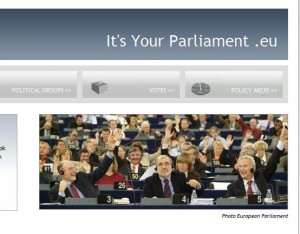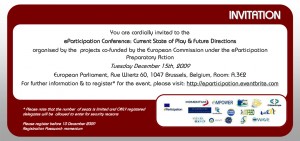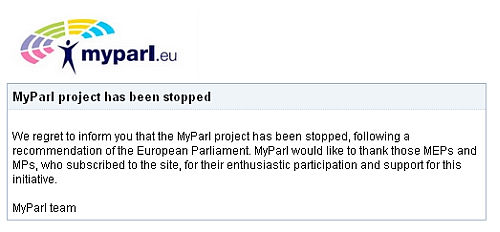Only articles in with the "EU" tag are displayed
To display all articles click
here.
 |
19. January 2011 – 11:44 by John Heaven (TuTech Innovation GmbH)
|
A report to the European Commission recently called upon Member States to step up their efforts to digitise catalogues of cultural works including books and paintings. This presents some challenges which I think help us to reflect on issues surrounding open data.
The act of digitising works costs money and doing it properly – ensuring that prints are of a high quality and high enough resolution to make them useful – can be expensive. As with any expenditure, public organisations have to demonstrate that their investment is justified by a public need or that they can recoup the money by selling what they produce. This is exactly what Birmingham Museum and Art Gallery has done by selling on-demand prints of their works online. The argument that these works are public property and should be available free of charge may hold in principle, but if all works are made freely available then the funding must come from elsewhere or they simply won’t be digitised in the first place.
I think the same applies to open data: the data may be on paper, or uncollected. The act of collating this data simply for the purpose of making it public costs money and this investment will need to be justified against many other competing demands on the public purse. Where data is already in digital form and it is simply a case of putting a spreadsheet on the internet, the argument is more straightforward; but when it costs money to collect it and make it available it is more complicated, especially if the data is already a source of income. Why would you want to give companies that happily pay handsome sums for, say, mapping data this information free of charge? Why spend lots of money collating data that perhaps nobody will use?
The Localism Bill (see previous article) attempts to solve this by releasing data according to the wishes of local residents. I think we should be exploring other ways of ensuring that data remains a source of income whilst being available for people like community activists and volunteers who want to use data to improve their surroundings.
Public authorities should think about making data available under a Creative Commons licence. This could allow them to preserve their income streams by prohibiting commercial use, whilst allowing people to use the data for personal and voluntary means. It may even encourage more people to buy their datasets by giving them the option to “try before they buy”. Further, there may be some instances where a private company can work with a public authority to collect data for its own purposes and at its own expense. By obliging the company that collects the information to make it available for non-profit public use, this may be a way of covering the costs of data collection whilst retaining the principle of openness.
Posted in open data, Trends | 2 Comments »
 |
7. June 2010 – 16:36 by John Heaven (TuTech Innovation GmbH)
|

Vienna Airport: free wifi
Everyone is talking about citizen-led service redesign these days, the idea that social media can allow citizens to design services and thus help the public sector meet their needs better whilst reducing waste. IDEA (the UK’s Improvement and Development Agency) is following up the publication of Local by Social, a guide to using social media to solve local problems, by teaming up with FutureGov to host an event bringing together local government officials and social innovators.
Hopping on a plane for a day is not quite the same as taking the train to Bristol, which seemed to happen at the drop of a hat when PEP-NET member Delib organised an event to plan the future of Britain’s deliberative democracy. Would this or something similar work on an EU level, and what are the specific issues it would face?
Whilst local authorities deliver hundreds of services on a local level, the EU is more distant. The ratio of citizens to staff is much higher, which makes that contact more difficult. The ever-present language barrier is a problem, as it always is when co-operating with other EU countries. Finally, the distance that you would have to travel to have face-to-face meetings is a lot larger. And worst of all, you’d have to meet in a café rather than a pub!
But the first question you would have to answer would be “What to design?”. One candidate is the European Citizens’ Initiative (or an online version of it), which is a provision in the Lisbon Treaty stipulating that if 1 million European citizens sign a petition, it has to be considered by the Commission. echo source started the ball rolling on this blog by raising some questions that need answering.
Then there is the Commission itself. It has made a commitment to demonstrate eGovernment as part of the Digital Agenda, and started a blog asking how it should use social media in its communications. How do citizens want the Commission to implement eGovernment in the coming years?
Or how about something new? Say, mini-grants for communities that want to twin themselves with communities in other countries and run a hyperlocal blog with an international touch, and a bit of money for cultural exchanges? As ever, ideas aren’t in short supply but it’s a matter of finding the best ones and putting them into practice. So it all comes down to cracking some of those problems I mentioned above.
Whatever you think of the EU, the freedom of movement, single currency and cheap transport between member states, added to access to online tools — brilliant at allowing collaboration over long distances — means that there was never a time when citizen-led service redesign on an EU level was more possible!
Posted in Trends, Uncategorized, Visions | No Comments »
 |
20. April 2010 – 15:06 by Madarász Csaba
|
The European Citizens Intiatiave is on the right track after the Lisbon Treaty to open new gates to the European Commission.

European Citizens Initiative
1 million signature – not so much, if we think about the population of Europe.
The ECI is giving a sharp outlook on their website about the passed public consultation and Commission’s points.
If you have not heard about the ECI -documents below helps to formulate opinion and getting know the project better visit their website https://www.citizens-initiative.eu/ or start browsing the core documents here:
Posted in inclusion, News, Projects | No Comments »
 |
18. March 2010 – 17:03 by Civil College
|

We have seen various examples , how national parliaments are using the data available in parliament records to display on websites.
It is unlikely to have a function to easily find and compare voting records of political groups and individual representatives. The data is from the 2004-2010 years, and obtained from the official site.
This mashup site: www.itsyourparliament.eu provides this function with a really accessible user interface and a possibility to comment.
This social responsible mashup have built and mantained by Buhl & Rasmussen without any financial support from the EU or other is a typical case, that we citizens like, admire and even encourage to follow – when somebody has the spirit, talent and skills to point out and re-engineer information holes based on public data sources.
This example highlights the importance of open standards and open data, which technically makes possible to build a services like this. Just like in the offline world, where accessibility to relevant information is a cornerstone for real participation, here, accessing data in appropriate format (open standard) is equivalent.
Empowerment subnews.
In Hungary, a success story of right defender NGO, HCLU (TASZ) is highlighting the issue of e-participation in civil campaigns.
After a journalist investigation on the planned new Hungarian Motor Race court’s financial background - to involve state aid and loan /see the story here https://www.xpatloop.com/news/63685 -sorry, but the editor has some bugs now/, – a couple of NGO’s, dealing with transparency have started to run a small scale email campaign, to get different data, related to the planned investment.
A few hundreds of emails has resulted a big scandal in the Hungarian political arena, and saved 35billion Euros for Hungary.
Writing an email, signing a petition does worth the time investment of a few minutes. Although, there might be only 1 from 1000 cases to produce such a big saving, but we have to be aware and spend some time to scan trough our facebook group messages and emails.
A few minutes every day can make us better e-and-non-e citizens!
Posted in News, Uncategorized | 1 Comment »
 |
24. November 2009 – 16:59 by POLITECH
|
Have you ever wondered what the European Commission (EC) and the European Parliament (EP) do to diminish the democratic deficit in the EU and to involve the citizens into decision-making processes of the European Union? You can now see for yourself and participate in one of the most important events of 2009.
The projects co-funded by the EC under the eParticipation Preparatory Action are organising an eParticipation Conference, which will be held in Brussels on Tuesday, 15th of December 2009 at the European Parliament (Rue Wiertz 60, 1047 Brussels, Belgium, Room A.3E2) .

The development and wide use of powerful new ICT applications is transforming the way citizens and civil society interact, debate and participate in public life. These new tools have enormous potential to enhance decision-making processes by involving large numbers of EU citizens.
As the eParticipation Preparatory Action, an initiative of the European Parliament launched in 2006, reaches its conclusion, this eParticipation Conference is being organized to demonstrate progress and results in the use of Information and Communication Technologies to enhance citizens’ participation in democratic decision-making. In parallel, there will be an exhibition of project results produced in the context of the Preparatory Action. This is a unique one-time opportunity to see all the projects in one place and to engage into a conversation with projects’ leaders and representatives.
Register to the conference before 10 December 2009 at: https://eparticipation.eventbrite.com (registration password: momentum)
Note: The Conference is free, but only registered delegates will be allowed entry for security reasons. All the participants should have some type of identification documents (for EU nationals – passports or national ID; for people from outside of the EU – valid passport documents are necessary).
For further information, please visit: www.ep-momentum.eu or contact: momentum@atc.gr
Posted in Events | No Comments »
 |
27. April 2009 – 17:24 by pol-di.net e.V / politik-digital.de
|
For those who haven’t decided yet on their favourite party for the elections in the European Union, 4-7 June 2009, a new interactive web feature, the EU-profiler, helps to make up your mind. The tool promises support in discovering the political landscape for the upcoming elections in Europe. However, its functionality and clickability are not free of hitches.
Read the rest of this entry »
Posted in News, Tools | 1 Comment »
 |
3. April 2009 – 17:48 by christophdowe-politik-digital.de
|
<!– @page { margin: 2cm } P { margin-bottom: 0.21cm } –>
A new web-survey – labeled with the telling name „tellBarroso.eu“ – invites all EU-citizens to post their opinion about the EU policy areas. The survey suggests that the messages go all the way up to José Manuel Barroso, the President of the European Commission. It seems odd though that the institution behind the survey is a party-affiliated think tank.
The distance to Brussels has never been shorter: The website tellbarroso.eu suggests the direct interaction between you, the EU-cititzen, and the President of the European Commission, José Manuel Barroso. Barroso invites you to post your opinion about the policy areas of the European Union and how it can “improve your“ life. And he promises, that tellBarroso.eu is a „simple, non-partisan web poll“.
It is indeed simple. In a first step, you have to tick some social indicators, most likely for statistical reasons. In a second step, the user is invited to name a policy area and post his/her opinion about it. The third step constitutes a nice clickable feature, which is a sort of opinion-dartboard. By drag-and-drop the user arranges a random selection of statements around the bullseye. The distance to the centre of the board thereby indicates the importance of the particular statement.
However, the non-partisan bit of the poll is quite questionable. The institution behind this service is the Centre of European Studies, a think tank affiliated with the European People’s Party EPP, which constitutes the largest faction in the European Parliament. It is not so much a disturbing fact that Barroso, an EPP member himself, offers his image and his name for an interactive process which generates EU-citizens’ opinion about the EU and its work. Yet it becomes an issue if such poll is marked as non-partisan whereas the party-links appear that obvious.
Posted in News | No Comments »
 |
4. March 2009 – 11:15 by E-Voting.CC
|
This is a reply to the post: “Recommendation on E-democracy – adopted by the COE”.
It shall clarify the critiques on the CAHDE working-group, posted here earlier, which – in our opinion – missed out some details about the project.
The Council of Europe (CoE) established in 2002 the Ad-Hoc Committee on Electronic Democracy (CAHDE) aiming at creating a legal document suggesting standards of E-Democracy, formulating principles for introduction and providing generic definitions and analyses of tools and policies to facilitate the introduction of E-Democracy. The goals were challenging and manifold: they span from the general reaffirmation of essentials of democracy and the extension of democracy by using ICTs to facilitate information and deliberation of political issues and until the increase of transparency and accountability of democratic institutions and processes. The Committee of Ministers adopted the recommendation on February 18th, 2009.
A critical discussion of results and outcomes is important and necessary. Especially if we are aiming at giving advice on upcoming developments and technologies, that are not mainstream in the near future. Let us clarify some important points in advance and sketch the framework for discussion.
Read the rest of this entry »
Posted in News, Projects, Tools | No Comments »
 |
24. February 2009 – 13:43 by Danish Technological Institute
|
Moving a step closer to making the final recommendations for EU level actions the European eParticipation Study’s has just published its second wave of deliverables. The documents are available on www.european-eparticipation.eu (Publication/Public Deliverables section).
The second wave of project deliverables consists of the following eight documents:
• Major factors shaping the development of eParticipation (D1.1b)
• Key actors in the EU in the field of eParticipation (D1.2b)
• Main benefits of the eParticipation developments in the EU (D1.3b)
• Mapping the state of play in eParticipation in the EU (D1.4b)
• Second post-workshop report (D3.2b)
• Framework for eParticipation good practice (D4.1b)
• eParticipation good practice cases (D4.2b)
• eParticipation recommendations second and third version (D5.1c)
The third and final wave is anticipated in May/June 2009 and will take into account comments by the European Commission, the project’s peer review group as well as further work conducted by the consortium partners in the intervening period.
Practicing what it is preaching, the European eParticipation Study, together with PEP-NET, will make use of the eParticipation issues unearth during the project in a joint online consultation 2-13 March 2009 (further information to follow).
Morten Meyerhoff Nielsen, Danish Technological Institute
Posted in good practice, News, Projects | 1 Comment »
 |
17. December 2008 – 11:55 by Hans Hagedorn
|
It was planned as a “political MySpace”: MyParl.eu should have been a networking site for Members of the European Parliament (MEPs) and Members of the national parliaments (MPs), a virtual space to connect and share information and opinion. The project, financed with about 4 mio. Euro was first announced in May, a launch-party was scheduled for October. And until the beginning of October, everything seemed to go fine. So, a few days ago, I was very surprised when I tried to take a look at the site and was welcomed by a mere sign reading “We regret to inform you that the MyParl project has been stopped, following a recommendation of the European Parliament.” That sounded like a serious change of mind. What has happened?

Read the rest of this entry »
Posted in Projects | 4 Comments »












